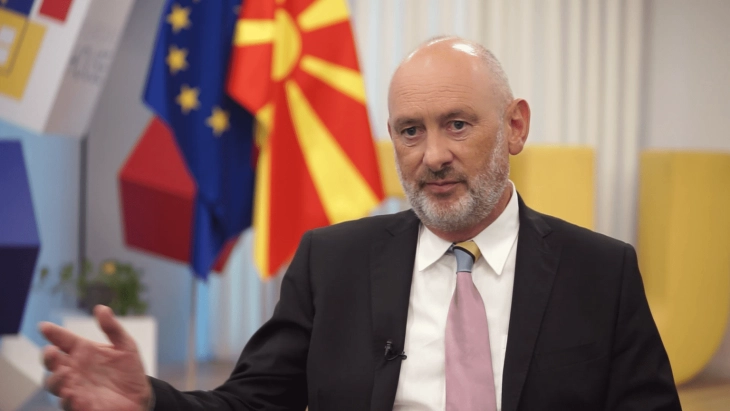EU accession to be treated as a national project, says Ambassador
- The European Union’s Ambassador to North Macedonia, David Geer, in an interview for 360 Stepeni, said that the goal of the visits of foreign politicians to the country is not to exert pressure or to force the country into anything, but that they’re coming as friends in order to explain the broader political context of the opportunity that now exists.
- Post By Angel Dimoski
- 15:54, 6 October, 2023

Skopje, 6 October 2023 (MIA) – The European Union’s Ambassador to North Macedonia, David Geer, in an interview for 360 Stepeni, said that the goal of the visits of foreign politicians to the country is not to exert pressure or to force the country into anything, but that they’re coming as friends in order to explain the broader political context of the opportunity that now exists.
“I’ve seen many of the visitors that have come here, they’re coming as friends. They’re not coming here to pressure or force the country into anything, they’re coming as friends to, on the one hand, explain the broader political context and the opportunity that now exists, and also to listen and share their views and experience of their own enlargement process concerning issues around identity or culture. No one loses their identity on the way to the European Union, that’s the experience of all of those member states that have joined,” said Geer, asked to comment the statement of VMRO-DPMNE Vice-President Aleksandar Nikolovski, who said the foreign politicians visiting Skopje in order to exert pressure over the constitutional amendments are in fact pushing the ethnic Macedonians to accept they have Bulgarian history and a language with a Bulgarian origin.
According to Geer, by joining the EU, a country becomes stronger, and with it, he said, so does its culture, identity, and understanding of its own history.
“So none of those issues in my view are at stake. Regarding language, part of the agreement from July 2022, is that the Macedonian language is the language that will be used within the negotiating framework, within the negotiations themselves. The EU legislation will be translated into Macedonian, and we’ve already seen with the Frontex Agreement that there is an agreement signed in Macedonian, together with other EU languages, all treated as equal. And so, I think what you’ve seen is a reinforcement of the Macedonian language. If you ask me who is the strongest proponent of Macedonian in this country, my answer would be the EU delegation. The EU delegation has promoted the work of great Macedonian writers such as Aco Shopov, Goran Stefanovski, Kocho Racin. We’ve also funded the translation of some 420 works of European literature into Macedonian, we also support the Babylon award which is an award which has been running now for ten years, for the best translation into Macedonian from different works of European literature. So again, I think it’s about the way in which the process can reinforce the identity, the language, and the culture of the country,” said Geer.
Asked how he deals with the fears of the politicians from the opposition, during his talks with them over the same issues – language, culture history, Geer said he does it very much like the many politicians who visited Skopje.
“They came with the spirit also wanting to provide reassurance on all of these issues, and certainly in the discussions I have, not just with opposition MPs or politicians, I also travel across the country and meet people in very different towns, we have these very nice events where we literally have a town hall meeting in a café, talk to citizens and I share these views with them, and they, of course, take their own view on that. But, I think I can share that clear perception that on the way to the European Union you see the country, as a whole, strengthened including its identity and its sense of itself,” said Geer.
In terms of 2030 as the deadline for the new enlargement of the EU, Geer said that whether it happens or not, doesn’t depend much on the EU, but on the dynamics in the country.
“The person who most recently mentioned 2030 was the President of the European Council, Charles Michel, speaking in Bled. I think what he was doing there, he was clear, he was describing, as I have, the overall context and intensification of discussions on enlargement, the seriousness with which we are now approaching this, but at the same time he was saying ‘there is an opportunity here’, 2030 is a date which is an opportunity that you could perhaps seize in order to join. That was his own view on that, but he was saying this was a chance. Whether or not that happens, doesn’t depend so much on the European Union, it depends very much on the dynamics here, and for that I think a number of things need to be in place,” stressed Geer.
According to the Ambassador, the most important thing is that politicians from across the political divide, and people from different parts of the administration and institutions, come together and treat the process as a national project.
“The reforms in line with the EU standards are really the key priority in the coming years. If that is done, if they work together, not necessarily in coalition, they can be opposition… But, if they agree on these core reforms and push forward in a determined manner, then it can be achieved. It’s exactly what Croatia did. Croatia, in its enlargement process, there were different changes of Government, there were strong political differences, but there was agreement on the core issues. They managed to achieve that, they joined the EU and that same determination has shown through as they’ve now moved to the Euro and also to the Schengen Area,” said Ambassador Geer.
Photo: MIA Archive







